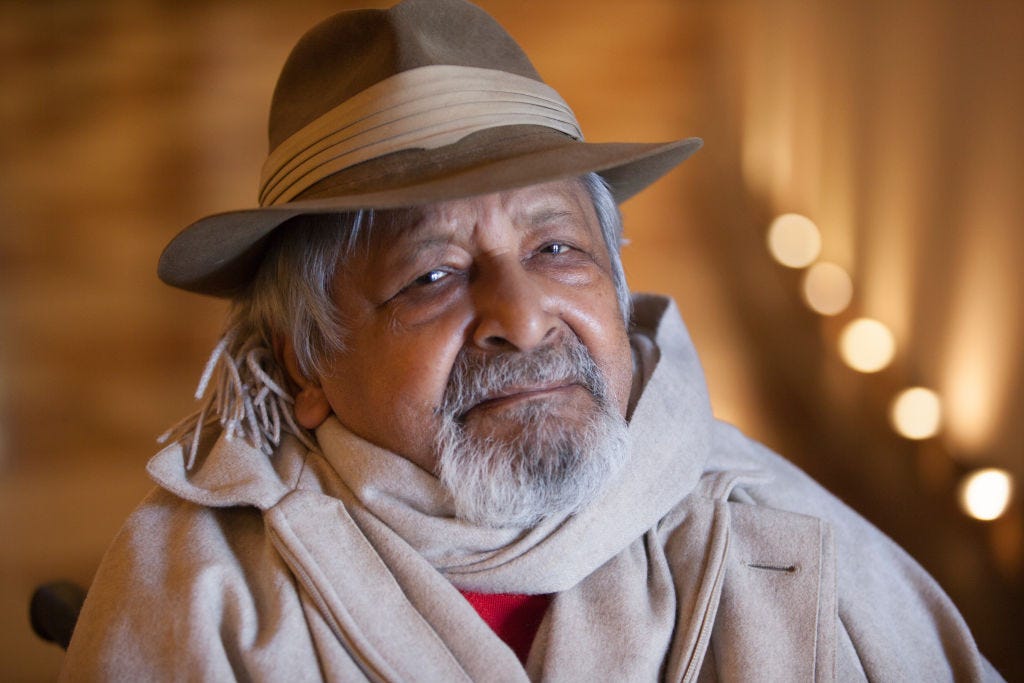One winter twenty years ago, not long after I moved to New York City, I was walking down a street in Midtown Manhattan when another Indian gentleman, very well dressed in an expensive camel coat and a brown fedora, stopped me on the sidewalk and asked me if I was me.
Yes, I replied, indeed I was.
“Very good,” he replied, in a soft, courteous voice. “I just want to tell you that V.S. Naipaul is a ten times better writer than you.”
“Well,” I said, “then you should be pleased, because now you’ve told me.”
“Yes,” he nodded. “I just wanted you to know.”
He raised his hat slightly, replaced it, and walked away.
A couple of days ago, one of you asked me if I had “changed my mind” about Naipaul, and said that he thought A House for Mr Biswas was one of the finest novels of the 20th century. Just to be clear: I agree with that sentiment completely. I love Mr Biswas and his house. In fact, I love the warmth, comedy, and humanity of early Naipaul, the Naipaul of Miguel Street, The Mystic Masseur, The Suffrage of Elvira, and Biswas. I also greatly admire the achievement of A Bend in the River, even though it’s a colder book, and I think The Enigma of Arrival has many profound things to say about the experience of migration, although I find the narrative engine of the book a little under-powered, so that things sometimes move at too slow a pace for my liking. I have problems with some of the other books, Guerrillas, for example, but it doesn’t matter.
Our disagreements were mainly about his India books, and his reactions to India in general. Those were serious disagreements, but they didn’t affect my admiration of his best work.
We only met a handful of times, and those encounters were always cordial. The last time I saw him was at a party to launch Hanif Kureishi’s novel The Last Word, in which there’s a very Naipaul-like central character, presented not very sympathetically. Sir Vidia, instead of being affronted, decided to attend the book launch. He was in a wheelchair by then, but that didn’t stop him. When I arrived, Hanif said that Vidia would really like to speak to me. I went over to him and knelt down beside the wheelchair.
“There’s just one thing I want to say to you,” Vidia said. “I want to tell you that I never said anything bad about you.”
Oh, I thought, okay, then we’ll just forget all those arguments and dismissive statements about my work…
“When I said that thing,” he went on, “it was a joke, you know.”
I realized he was thinking about a remark he made when he was asked about the Khomeini attack on The Satanic Verses. When asked about the fatwa, he had said he thought it was “an extreme form of literary criticism.”
“Vidia,” I said, “:I know that was a joke. I know what a joke is, and that’s a joke.”
“Yes,” he said. “I never meant anything bad by it. I just wanted you to know.”
Again: I just wanted you to know.
What I felt that night was that Vidia’s health was poor, and he was trying to heal wounds and make his peace. And that is what we did.





So sorry you were stabbed. I will ask Our Lady if Fatima to help you.
Excellent stuff, and looking forward to more of these. I've just finished reading 'The Jaguar Smile' so I wonder if you could expand on this series: encounters of all kinds! I'd love to hear you reflect on your Nicaraguan journey and the people, including Ortega, that you encountered during it—and, of course, your thoughts on the present situation in that country, since Ortega really does seem to have confirmed the worst fears of the Sandinistas' critics back in the day. It's a sad decline.